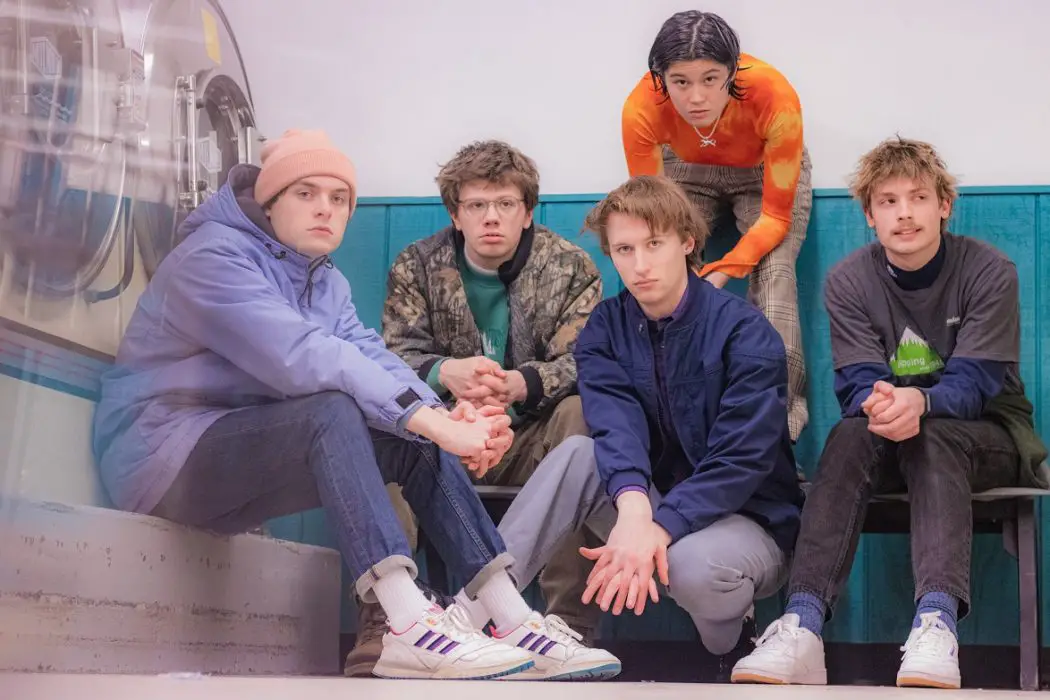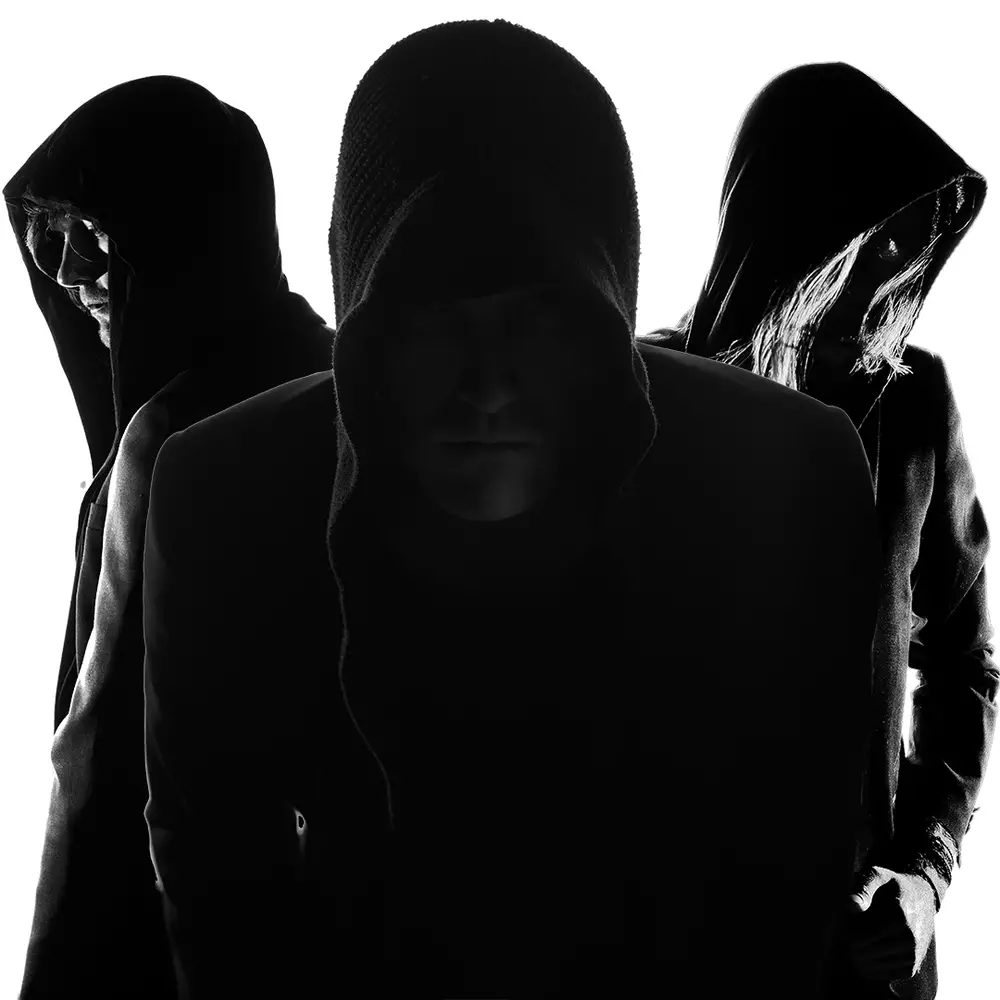Atwood Magazine speaks with new Saddle Creek residents Disq about their debut album ‘Collector’ and growing up together.
Stream: ‘Collector’ – Disq
Sometimes when you hear a song for the first time, you know immediately that you’re going to listen to it on repeat until you wear out the proverbial vinyl (or perhaps, the actual vinyl). “Loneliness,” one of the first singles from Saddle Creek’s newest band Disq, has all the qualities of one such song. In fact, so do all of the subsequent singles, and the whole album.
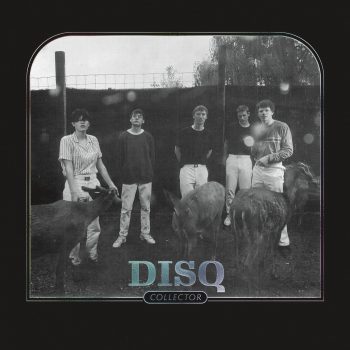
The Madison band’s debut, Collector (out March 6 via Saddle Creek), is a collection of songs pulled from individual member’s demos, written over the course of a lifetime of playing together. Raina Bock and Isaac deBroux-Slone grew up together, picking up bandmates Shannon Connor, Logan Severson, and Brendan Manley along the way. The band’s music is an amalgamation of early 2000s indie rock and the subtle, quiet drag of seasonal depression, filled with the bright chords and disaffected lyrics of someone trying to trundle their way through it head first. Collector has both a serious thesis and a sense of humor.
Atwood Magazine spoke to bassist Raina Bock and vocalist/guitarist Isaac deBroux-Slone ahead of the album’s release about the band’s family dynamic, scrappy Midwest energy, and good, simple guitar music.
:: A CONVERSATION WITH DISQ ::
Atwood Magazine: I know that a lot of these songs came from individual demos. Was it a vulnerable thing bringing these songs to the band?
Isaac: I mean it was in a sense, but it’s the way we’ve always done things, so in a way it was pretty comfortable as well. I feel like there’s like a lot of pressure kind of in indie music – or whatever genre is right now – to be kind of extremely intimate and revealing. So it’s always kind of tough when you’re bringing something in for the first time, but I think other than that we’re really comfortable with each other as musicians and creative people. So there wasn’t too much nerves with that.
I’ve been playing with my band for almost eight years and it feels like family. I can’t imagine what it would feel like to have known and played with each other your whole lives. Can you talk about how that’s affected you as musicians and people?
Isaac: It’s definitely interesting to have everything we’re doing be informed by stuff that we were doing together a really long time ago, which I think is kind of funny.
Raina: I think it’s also just really nice to have had good foundations of relationships outside of music before we started doing music together. We felt like that comes first and so there hasn’t ever really been any tension of any sort in the music.
Midwestern cities have really special music scenes in my opinion, tell me about what it’s like in the Madison music scene, and what you think you’ve gotten from it.
Isaac: Something that Raina said a little while ago that really stuck with me is that in bigger cities, especially coastal places, it kind of feels like if you’re being in a band it’s sort of expected that you’re like, shooting your shot as your career, and it’s a kind of intense thing. Whereas I feel like there’s a lot less pressure [for us], and people can kind of just make music just because they want to, rather than because of some sort of external pressure once you start going.
That lack of pressure often allows for so much more creativity because you're just in your own thing and not worrying about what other people are wanting from you.
Isaac: I feel like Madison doesn’t have as much of a distinct sound as other cities might have. It’s kind of cool to be less influenced by our peers, or if we are, to have them be kind of more outside of what we’re doing.
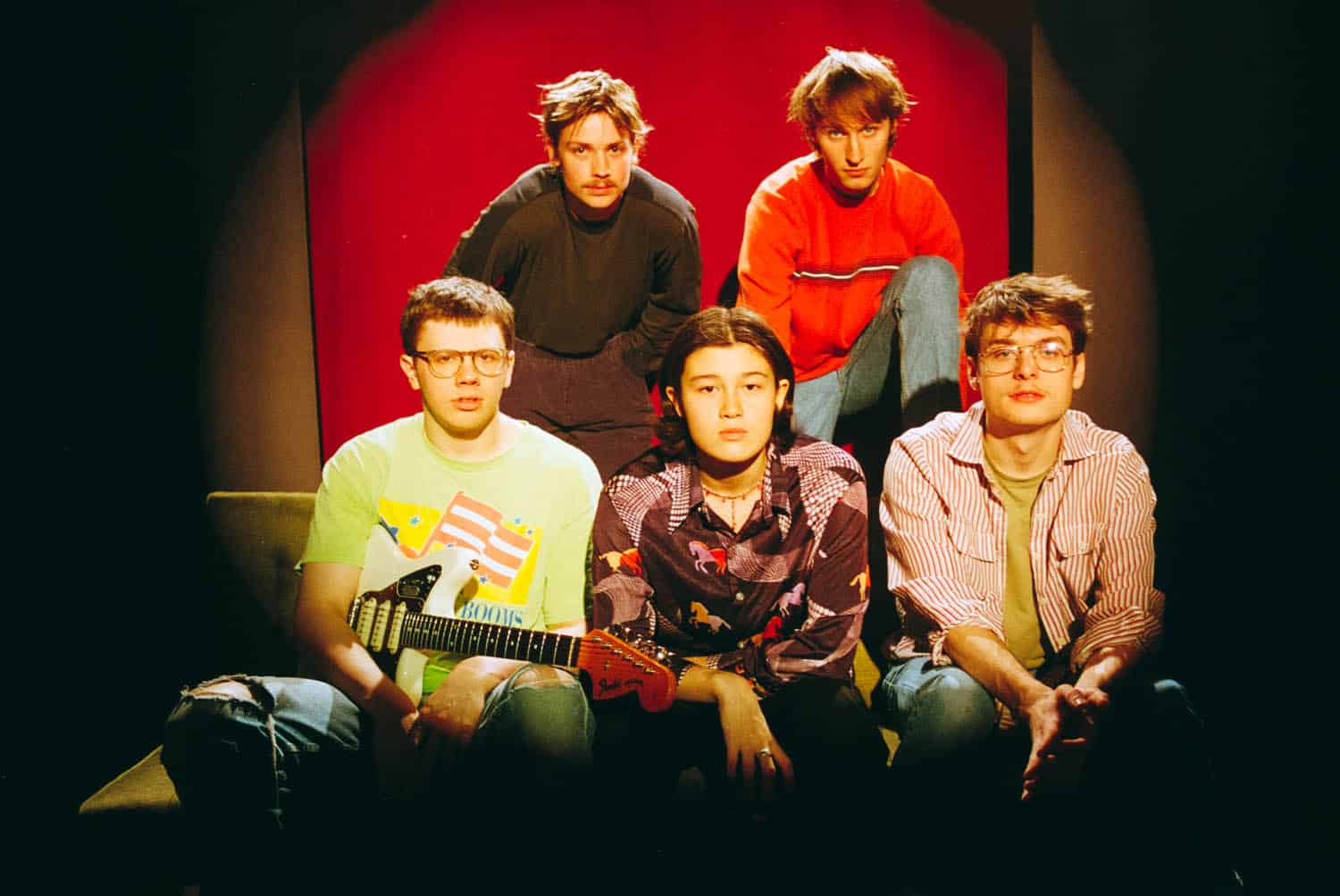
Raina, in the band’s bio you said, “I love feeling like an underdog, I’m super proud to have grown up in flyover country.” Can you expand on that a bit?
Raina: Yeah, I don’t know, I just think there’s a…whether it is an “us versus the world” thing, or it can feel that way. I think there’s kind of a scrappy energy in the Midwest bands that I really resonate with vand find very inspiring in general.
I’m a Midwest kid too, and a lot of the album really captures what winter depression feels like.
Raina: Definitely, I was just about to say that [laughs].
“Loneliness,” in particular, has that line, “I don’t get dressed ‘til I’m going out, I don’t know what I feel stressed about.” It’s so mundane, but also so visceral. Can you talk about that?
Isaac: Yeah. I mean, I don’t think it’s a bummer, but it definitely deals with some heavy subject matter. I kind of feel like a little bit of half and half on that. Partway through working on it, we kind of realized that a lot of the songs were really about sort of our personal fretting, and just small issues that kind of can seem like big things, or even just things that a lot of other people go through.
A big part of that as well is that the album has a really nostalgic sound to it while also fully being a product of today’s indie rock scene. I hear so much Pinkerton in there, but it’s definitely a product of growing up in the 2000s. How have you internalized music over the course of playing together?
Isaac: I feel like a big part of it is trying to pull from as many kinds of influences as possible. I think we’re all pretty big on just being up to date with what’s going on in the music scene. So it’s always changing, but whatever we’re listening to I think always has a really big effect on what we’re working on. It’s kind of fickle, but for each song on that album I could probably point out like five or ten different bands that we were being influenced by at that point.
I think that’s a cool thing because especially on a debut, people want to hear something new but they also really like to find things that are familiar to them. Saddle Creek hosts a lot of folk, and a lot of rock. You’re kind of right down the middle. Where do these genres meet for you?
Isaac: I feel like we all, especially me and Raina, are really heavily inspired by a lot of bands that have been on Saddle Creek recently, like Big Thief and Hand Habits, and stuff like that. It was kind of neat to try and lean into that side of what we’re doing a little bit more, once we knew that we were going to be working with Saddle Creek. I think that that was kind of a cool part of the process, just because they have such amazing songwriters on the label, but I feel like it put more pressure on me to feel like I was crafting really good songs. Having those artists as an example and inspiration was a really big deal for how the album turned out.
Raina: As far as drawing from folk music, that’s obviously the less obvious in the two genres that you compared us to, but I think definitely trying to learn from lyric styles and stuff like that – writing vulnerable lyrics and then also trying to put emphasis on really solid pop melodies and accessible melodies.
Isaac: I think a big thing for me is that I’ve really into Wilco in the past year, and I think that they’re a super prime example of being able to fuse really, really good, simple songwriting with kind of cool, outlandish more rock production. I think that was really inspirational.
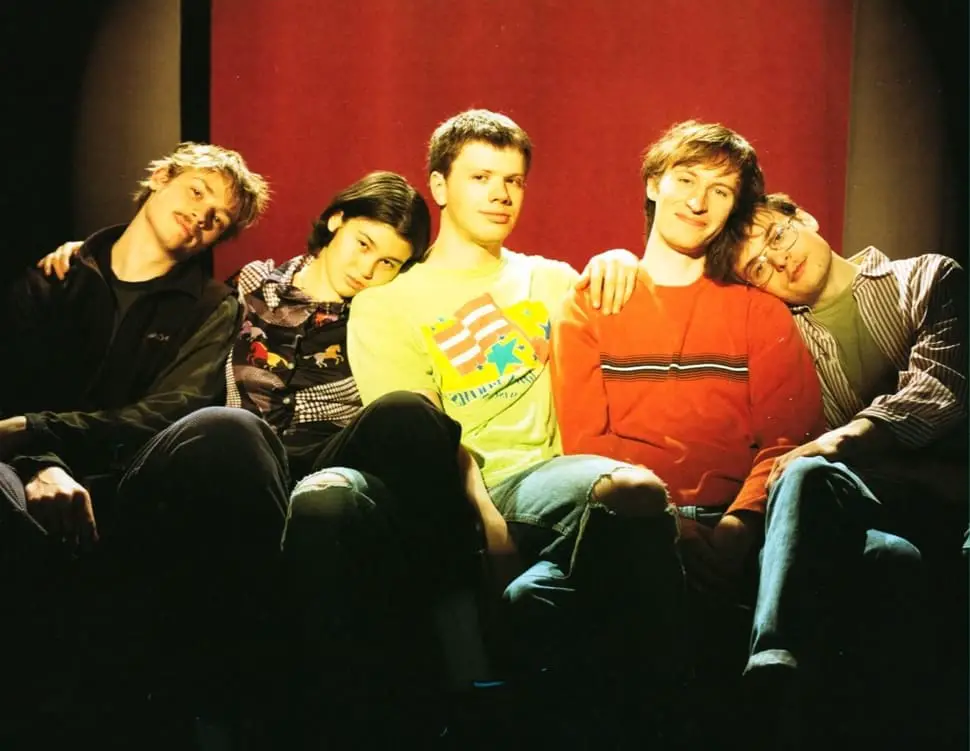
With music that you would define as “guitar music,” there's something that is just so satisfying about a really simple, powerful chord progression.
Isaac: Yeah, that’s the kind of thing I wanted to be able to expand on. You can do whatever you want, but you still want to be good if it’s gonna be simple.
Can you talk a bit about the album title itself? I've been curious about if that has to do with the fact that you kind of collected all these demos, or where that came from.
Isaac: So, it first came from a song on the album called “Trash.” And we were thinking of making it just Trash Collector. And then once we thought about that a bit more, it was kind of like, “Ooh, maybe we could call it Collector, ’cause it’s a collection of all these different moments in our lives and different people’s songs.”
Raina: And also less easy for us to be smeared in reviews [laughs].
Isaac: Right, I forgot about that. Way too easy.
What song on Collector is the most meaningful for each of you and why?
Isaac: Oh, I’d say probably either “Daily Routine” or “Drum In.” Those are both probably written like the most from my point of view, and they both have really specific connections to my life and feelings that I’ve had. Those songs are very personal to me, and they still kind of ring true.
Raina: I also definitely think that in terms of what song feels most important on the album, probably “Drum In.” I feel like that was a good nod towards hopefully where we’re going with the next album and the albums to come. And then I also feel like it kind of sums up the whole album in a nice way. I also feel pretty connected to the song “Konichiwa Internet.” That song has been around for a long time. We’ve been playing it forever so it’s pretty special.
Are there musicians that have influenced your writing or playing that haven't necessarily found their way into your music in an obvious way?
Isaac: Kind of touching on just what I was talking about earlier, I feel like bands like Big Thief and Hand Habits have been majorly influential just because of how good their songs are [laughs]. It’s made me kind of reframe the way I think about songwriting. I don’t think anybody would probably ever say that our album was directly influenced by either of those artists.
Raina: I’ve been listening to a lot of house music and more straightforward, really driving dance music, which would be pretty impossible to find in the music itself [laughs]. But I’ve been pretty inspired by either music that is so effective while being so simple like house music, or artists that really have an amazing show, like the spectacle of the live show. That’s kind of been what’s really interesting to me recently.
What do you hope people take away from your debut?
Isaac: I guess it’s nice to feel like maybe like people can connect to what I or we’re writing about. I know that I can find some emotional comfort in other people’s music, so that’d be really nice for that to happen. And it would also just be cool for people to want to listen to more of our music after they hear the album. I think that’s the biggest hope.
Raina: Like Isaac was kind of touching on, I feel like the album has a lot of really universal themes. But also, when you are in some ways isolating yourself or depressed or going through it, you forget that there’s anybody else in the world that could possibly be feeling the same way. I just think trying to do that for other people so it kind of becomes a little loop, and hopefully makes you feel better as an artist as well, knowing that’s reaching people.
— —
:: stream/purchase Collector here ::
— — — —
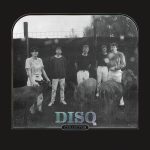
Connect to Disq on
Facebook, Twitter, Instagram
Discover new music on Atwood Magazine
? © Megan Vieth
Collector
an album by Disq

